Click here to join our mailing list.
Jungian Odyssey 2024
Ora et Labora: Doing the Self in Uncertain Times
Join us for our 17th Jungian Odyssey Conference & Retreat!
Photo: Kloster Disentis, ©Adrian Michel, Own Work, May 2014.
(Published in accordance with the GNU Free Documentation License, WikiMedia Commons; downloaded June 23, 2023)
Ora et Labora: Doing the Self in Uncertain Times
The genius loci continues to guide us, now as we set out for the village of Disentis/Mustér (1,130 meters/3,700 feet) in Canton Graubünden and its historical Disentis Monastery, standing at the foot of Lukmanier Pass and Oberalp Pass. With its founding ca. 720 AD as a Benedictine hermitage, the early religious community continuously defended itself against foreign invasion, starvation, the plague, alleged witchery—and far later, burning and plundering by Napoleon’s troops. Adjoining the monastery today is the stunning Baroque church St. Martin’s, “where light renounces noise.” Originally completed in 1712, St. Martin’s underwent a highly impressive (and costly) restauration from 2016–2019. The monastery still houses a small group of Benedictine monks, who welcome visitors to their hourly prayers and at their celebration of the Eucharist.
Inspired by the peaceful beauty of this place and its ongoing Benedictine tradition, we want to explore potential links between the monastic practice of “ora et labora”—“pray and work”—and one of Jung’s particular ideas about the challenge of individuation: How do we manifest the Self or the “god within us” in our daily lives, incarnating it in our concrete deeds (C.G. Jung, CW7, §399)? How might we ground our action in the spirit while allowing our spiritual practices to be informed by our acts? While facing the urgent issues of our own uncertain times—including the ecological crisis, widespread wars, proliferation and intrusion of technology and fundamentalisms—Jungian psychology offers a rope to hold tightly, as we plunge into the depths of our own souls. With grace, might we discover or retrieve the light that illuminates our path, radiating through our own practice, relationships, and community?
Download the program brochure for details on the entire week.
Date & Venue
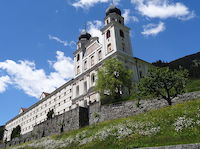
25 May – 1 June, 2024
Retreat Setting:
Disentis Monastery • Disentis-Mustér, Switzerland
Over the course of time, the monastery became a well-known spiritual and educational center, which also maintains a private high school with a significant number of boarding students. So, we may encounter some of the young people during this Odyssey! In keeping with monastic tradition, the bedrooms are rather small, clean, and simply furnished. Most of the rooms are located within the monastery itself, while some are footsteps away. Most rooms are equipped with a toilet and shower or bath; a few have shared facilities on the same floor. A salon, a reading room, and a cozy bistro with an outdoor terrace all offer casual gathering places. At certain points within the monastery halls, you may view the building’s ancient stone foundations—and you will find precious historical treasures displayed in the small museum. Throughout the premises, wireless LAN is available (at no cost), but limited to 6:30 AM – 11:30 PM. Early registration is recommended, as space is limited and the Odyssey typically books out. Also, early birds receive a price advantage!
Guest Speakers
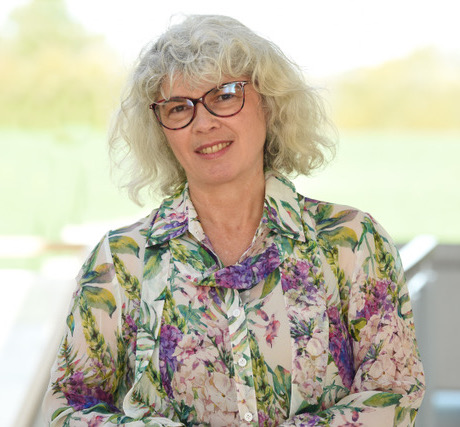
Catherine Cox, BA
Catherine Cox, BA is a Jungian Analyst (BJAA) working in private practice in London. Her early background in theology, pastoral theology (Jesuit-affiliated Heythrop College at the University of London) and ministry (inner city parish and prison chaplaincy) gave way to her career as a lawyer in an international law firm, before the two opposites came together in her vocation as an analyst. Her training in Sensorimotor Psychotherapy, with its neuroscientifically-informed techniques, opened the door to working with the body, whilst The Red Book nurtured the spiritual dimension. Catherine’s passion for community and her interest in inter-generational trauma (especially what Jung perceived as the “lament of the dead”) are currently reflected in her work with the #WithUkrainianJungians project (see https://aras.org/wuj).
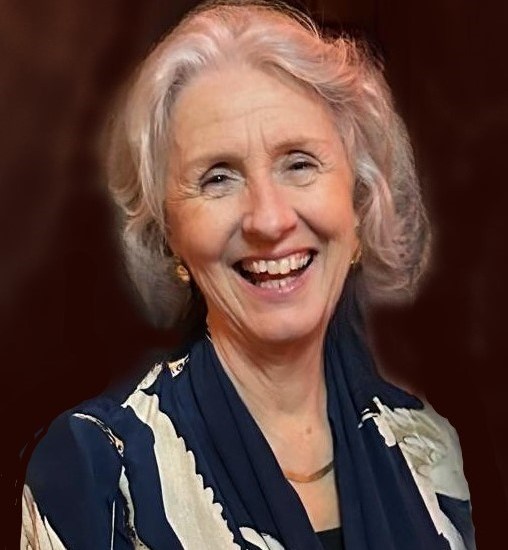
Marian Dunlea, MSc
Marian Dunlea, MSc IAAP, ICP, is a Jungian analyst and Somatics practitioner who has been teaching and leading workshops internationally for the past 30 years, integrating body and soul. She is the creator of BodyDreaming®, an embodied practice, and is director and teacher of the BodyDreaming Training Program. She is head of the BodySoul Europe training program, sister organization of the Marion Woodman Foundation, where she is core faculty. With the development of her unique approach BodyDreaming®, Marian incorporates developments in neuroscience, trauma therapy, attachment theory with Jungian psychology, and the phenomenological standpoint of interconnectedness. Her book, Body-Dreaming in the Treatment of Developmental Trauma—An Embodied Therapeutic Approach (Routledge), won the Gradiva Award in 2019 for best book with National Association for the Advancement of Psychoanalysis (NAAP) and is Co-Winner of The International Association for Jungian Studies Best Book Award, 2019. www.mariandunlea.com
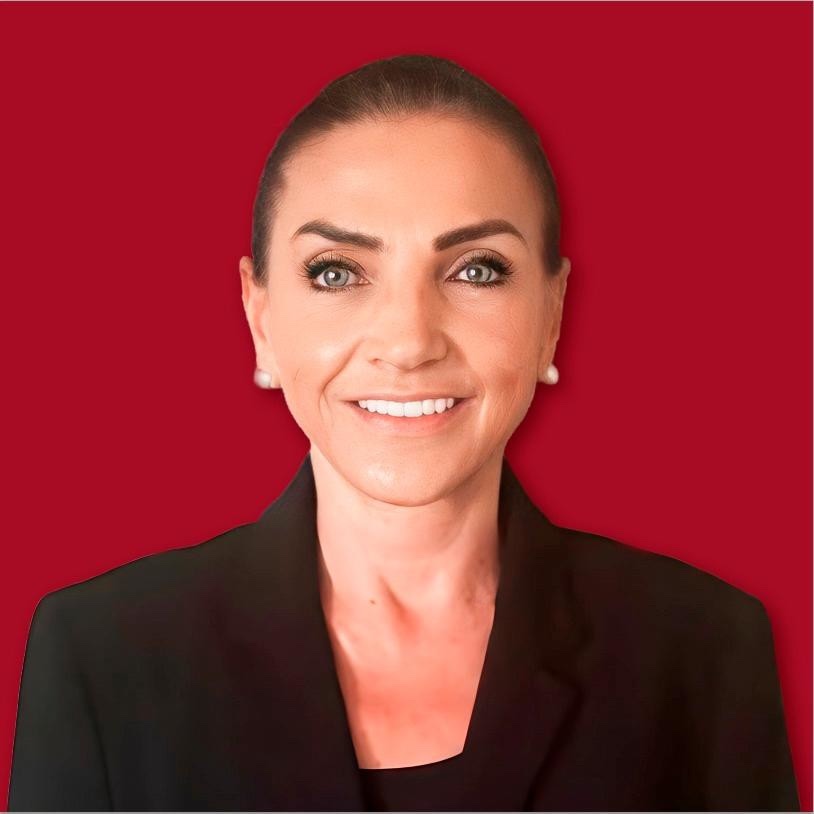
Patricia G. Michan, MA
Patricia G. Michan, MA, is a Jungian analyst certified by the IAAP (in 1995) with private clinical practice in Mexico City (since 1982). Founder and director of Centro Mexicano C.G. Jung. Assistant editor for the JAP’s Editorial Board. Member of IAAP and IRSJA. She has researched and published widely about the relationship between Analytical Psychology, ancient indigenous mythologems from Mexico, current cultural paradigms, and parallel patterns and dynamics in the individual psyche, including: “Reiterative Disintegration: Historical and Cultural Patterns and the Contemporary Mexican Psyche,” in Gudaite and Stein, Eds., Confronting Collective Trauma: Jungian Approaches to Treatment and Healing (IAJS); “Analysis and Individuation in the Mexican Psyche: Culture and Context,” Journal of Jungian Theory and Practice; “Analysis and Individuation in Latin Cultures and Contexts: The Mexican Psyche,” in Proceedings of the Fifteenth International Congress for Analytical Psychology (2003); and “Dismemberment and Reintegration: Aztec Themes,” Journal of Analytical Psychology.
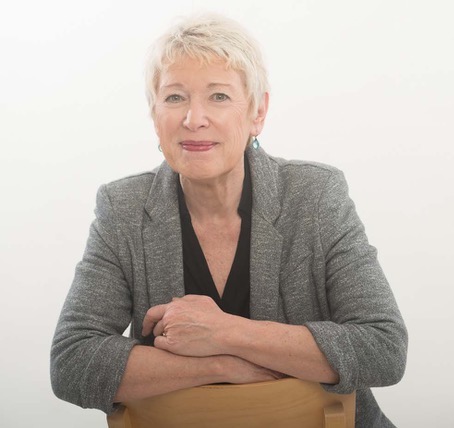
Polly Young-Eisendrath, PhD
Polly Young-Eisendrath, PhD is a teacher, author, speaker, psychologist, and Jungian analyst with a full-time practice in central Vermont (USA) who has published 19 books (and many chapters and articles) including The Cambridge Companion to Jung (edited with Terence Dawson); The Self-Esteem Trap: Raising Confident and Compassionate Kids in an Age of Self-Importance; and Love Between Equals: Relationship as a Spiritual Path. She is the co-author, with Jean Pieniadz, of a new book: Dialogue Therapy for Couples and Real Dialogue for Opposing Sides: Methods Based on Psychoanalysis and Mindfulness. Polly also directs the non-profit Center for Real Dialogue and co-hosts two popular podcasts: ENEMIES: From War to Wisdom; and Waking Up Is Not Enough: Flourishing in the Human Space. She is a lifelong Buddhist practitioner and a Mindfulness teacher.
With Faculty & Friends of ISAPZURICH
Cost & Registration
Odyssey Packages Include
• Group bus Zürich/Disentis/Zürich
• Hotel room & full board (daily breakfast, lunch, and dinner)
• Morning meditation
• Mid-morning coffee breaks
• 2 wine receptions
• 7-day academic program with a film evening, a private organ recital in the church, and one afternoon opt-in excursion (at cost)
• Exception: Package #3 The academic program is excluded for non-attendee partners (apart from the Saturday lectures and the special events, which they are welcome to attend).
• Exception: Package #4 is a limited 2-day “taster” program for residents of the Disentis area (group bus travel, hotel overnights, and hotel amenities are not included).
Limited Enrollment • Unparalleled Value
Register soon to ensure your place and save on your Odyssey package!
Final Registration Deadline: April 5, 2024
ISAP students are subject to other Terms & Conditions, including other costs and deadlines, provided by the FO.
Early Registration Deadline EXTENDED to March 25!
Registration by March 25 • Prices in CHF
Package #1
1 Attendee, single room • 2900.00
Package #2
2 Attendees, 1 double room, per person • 2750.00
Package #3
1 Attendee & 1 Non-Attendee, double room • Total 4100.00
Package #4
Odyssey Taster May 25 & 26, per person: 260.00
Registration after March 25 • Prices in CHF
Package #1
1 Attendee, single room • 3200.00
Package #2
2 Attendees, 1 double room, per person • 3050.00
Package #3
1 Attendee & 1 Non-Attendee, double room • Total 4500.00
Package #4
Odyssey Taster May 25 & 26, per person: 290.00
Special Events • Odyssey Packages #1, #2, #3
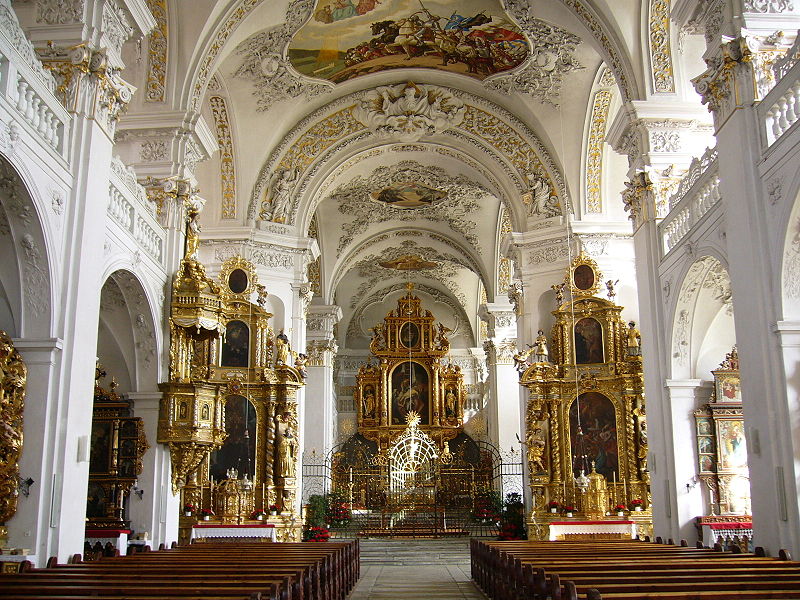
Sunday • Organ Recital in the Monastery Church
After dinner on Sunday we invite you to a recital with music played by the church’s organist, Brother Stefan Keusch, on the church’s mighty, 4,000-pipe organ. Dress warmly, as the church is not heated and can be quite cold! (Included also in package #4)
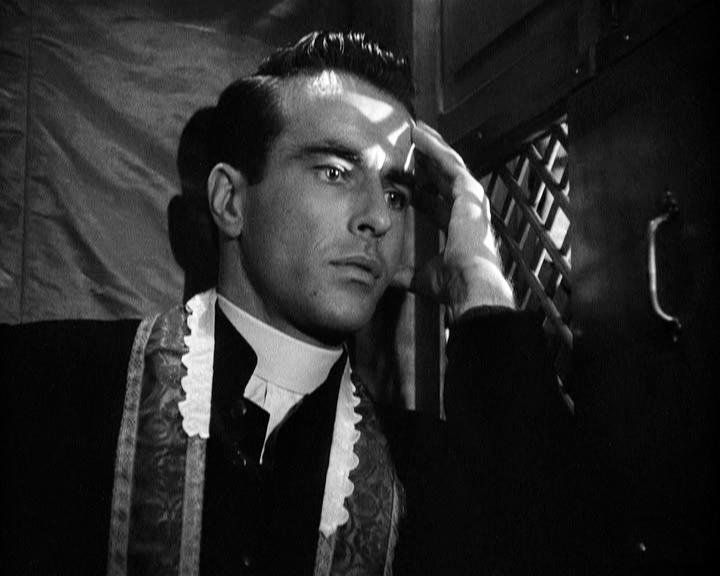
Monday • I Confess • By Alfred Hitchcock (1953)
Starring, among others, Montgomery Clift and Anne Baxter, Hitchcock’s film noire is billed as a “crime thriller about a priest who comes under suspicion for murder but can’t clear his name without violating the seal of the confessional.” The film will be discussed from a Jungian perspective as part of Richard Blennerhassett’s combined lecture and seminar on Tuesday.
Wednesday • Opt-in Excursion Choices
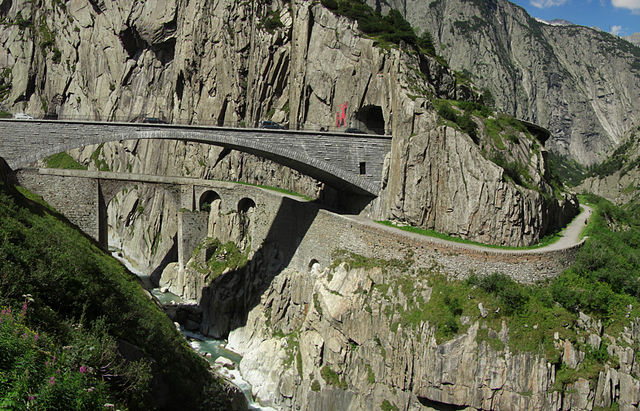
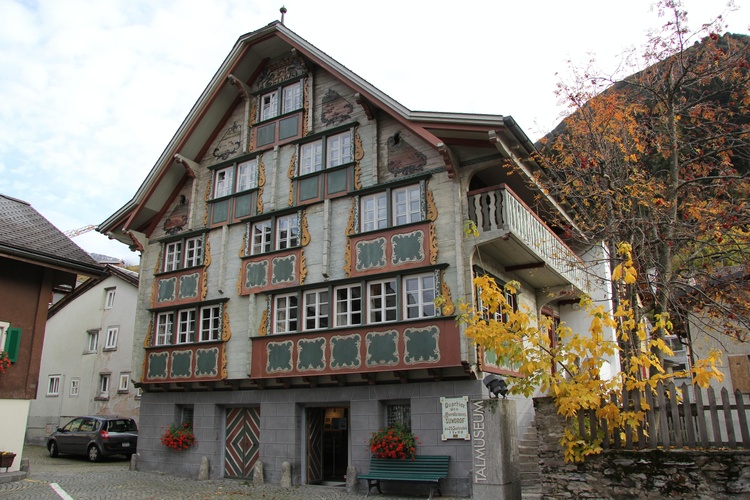
1. CHF 40.00 • Cog Railway Ride, Walk to Devil’s Bridge
& Guided Tour, Talmuseum Ursern
Cost covers round-trip cog rail trains and the guided museum tour. With the help of its cog wheel, the train ascends at an incline of 11% to Oberalp Pass (2,044 meters / 6,706 feet), where it travels along the beautiful Oberalp Lake before descending steeply to Andermatt (1,447 meters / 4,747 feet). An easy one-hour loop walk then leads us to Devil's Bridge, which spans the Schöllenen Gorge and the roaring Reuss River, and offers a "hair-raising glimpse into the gorge's depths [...]. [....] [In times past,] there was no way to reach this [...] gorge when travelers crossed the Gotthard Pass. [So,] the Urseren Valley villagers themselves built steps, wooden walkways, and paths. [L]egend has it that [...] the devil offered to help, but the villagers were able to outwit him.” (“Schöllenen Gorge,” My Switzerland, accessed Oct. 31, 2023)
After the walk, we’ll visit the Talmuseum Ursern in the village of Andermatt. Housed in a building constructed in 1765, this small, intimate museum displays the crafts and artifacts of a by-gone era of village mountain life. Guided tour: 45 minutes
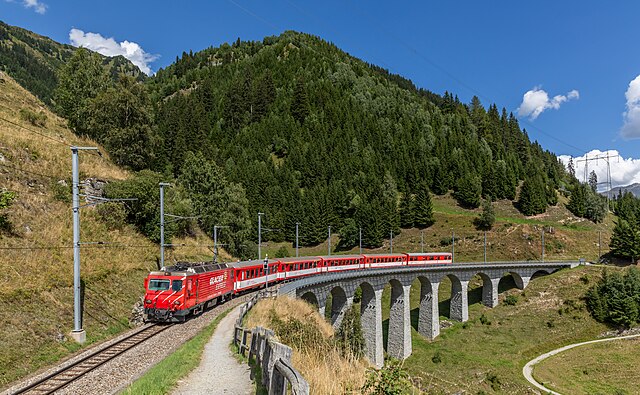
2. No Cost • Hike: Sedrun to Disentis
Cost of the one-way cog rail train to near-by Sedrun is covered by the Odyssey. The popular 9-km (ca. 6-mile) hike from Sedrun to Disentis takes 3–4 hours, following a path that parallels the train tracks. Along the way, we pass an impressive railway viaduct (commissioned in 1926) and have spectacular views of distant mountain peaks. Rated as medium level, this hike ascends 60 meters (200 feet) to an elevation of 1,400 meters (4,600 feet); descent: 360 meters (1,200 feet). Wear hiking boots or sturdy walking shoes. No sandals or street shoes!
Friday • Gala Closing
After our reflections on the week, join a hike from the monastery to the village of Disla and back, or rest and get ready for our traditional gala closing. A wine reception will get us started, and we will proceed to a celebratory 4-course dinner.
Special Events Photo Credits Top to Bottom
• St. Martin’s Church, Disentis Monastery, ©Peter Berge, July 2006, Public Domain (Wiki Media Commons, downloaded Nov. 14, 2023)
• Still from Hitchcock’s I Confess, Robert Burks, Cinematography, 1953 (The Movie Scene; downloaded Nov. 14, 2023)
• Devil’s Bridge, ©Oliver von Essen, August, 2009, Creative Commons Attribution-Share Alike International 3.0 Unported License (Wiki Media Commons; downloaded Nov. 14, 2023)
• Talmuseum Ursern, Andermatt, ©Photographer & Date Unknown (SchuKur.ch; downloaded Oct. 31, 2023)
• Hike Sedrun to Disentis, ©Kabelleger / David Gubler, Aug. 2030, Own Work, Creative Commons Attribution-Share Alike 4.0 International License (Wiki Media Commons, downloaded Nov. 12, 2023)
Program
Saturday, May 25
12:15–15:00
Arrival, Wine Reception, Lunch, Hotel Check-in
15:15–15:45
Welcome & Introduction
Maria Grazia Calzà, Dr. phil. & Lisa M. Holland, MS
Academic Co-Chairs, Jungian Odyssey
15:45–17:00
Polly Young-Eisendrath, PhD
The Rivers Dark:
A Development View of the Archetype of Self (Lecture)
Our universal human predisposition (archetype) to form an individual identity or self emerges from a source of darkness that cannot be grasped or seen directly. In this presentation, I show how we can discern and trace the patterns of our archetypal self by engaging with the life we are in—especially the relationships, crises, and uncertainties. I draw on my own life, my clinical practice with couples, the Gospel of St. John, and Zen Buddhism, all the while following the guidance offered in the lyrics by Leonard Cohen and Sharon Robinson, “By the Rivers Dark.”
17:00–17:15
Break
17:15–18:30
Marian Dunlea, MSc
“Sweating Our Prayers”:
BodyDreaming as an Approach to the Numinous (Lecture)
The BodyDreaming process is a conscious attunement of our nervous systems to bring ourselves into greater coherence with the self-regulating principle that governs all life in our universe. This is the work of “sweating our prayers”— a conscious alignment with the Self that has its roots in the body, in particular in the body’s nervous system. We come to recognize in the process that our body and soul, psyche, and matter, are each reflectors of what Jung referred to as “the numen, the hint of the god” (Visions: Notes of the Seminar Given in 1930-1934, Vol. 2 [Routledge, 1997, p. 919]).
18:30–19:45
Dinner
20:00–21:00
Who's Who?
An informal gathering for getting acquainted
Confidentiality is to be strictly observed for all experiential workshops, for our temenos and for seminars that deal with personal and/or case material.
Experiential workshops entail self-exploration and sharing aspects of one’s personal life. Therefore, for the protection of personal boundaries, attendance is excluded for analysts of ISAPZURICH and any others who might anticipate encountering or do encounter analysands, patients, and/or supervisees at these events.
Sunday, May 26
7:15–7:45
Meditation with Penelope Yungblut
7:30–9:00
Breakfast
9:00–10:15
Allan Guggenbühl, Dr. phil.
Inner Voices in Difficult Times: Distraction or Solace? (Lecture)
In this lecture I will concentrate on the effects, dangers, and resources that confront us in times of turmoil and personal and collective uncertainties. What happens when everything around us seems to crumble? It isn’t necessarily always a disaster, but might open us up to new pathways.
10:15–10:45
Coffee Break | Book Sales
10:45–12:00
Panel Discussion
Polly Young-Eisendrath & Marian Dunlea with Penelope Yungblut
12:30–13:30
Lunch
CHOICE
14:00–16:00
Polly Young-Eisendrath
The Rivers Dark: A Development View of the Archetype of Self (Seminar on Lecture)
14:00–16:00
Marian Dunlea
“Sweating Our Prayers”:
BodyDreaming as an Approach to the Numinous (Experiential Workshop)
14:00–16:00
Allan Guggenbühl
Inner Voices in Difficult Times: Distraction or Solace? (Seminar on Lecture)
17:00–18:00
Temenos
For the early Greeks a temenos was an area set apart from everyday life, a holy precinct or sacred ground. Following Jung’s metaphorical use of the image, for all who wish to join, our temenos offers a protected space for the sharing of personal experience, insights, and questions related to this Jungian Odyssey. Facilitated by Grazia Calzà and Lisa Holland, and contained in mutual respect and confidentiality, this is an open exchange that can deepen our spirit of community. Offered also on Thursday.
18:30–19:45
Dinner
20:30–21:10
Organ Recital • St. Martin’s Church
Wear warm clothing—the church is not heated and will be quite cold!
“So it comes home to us that the body is the ultimate reason of everything which can be represented in and by consciousness. [....] The great realization of the end of the nineteenth century is that the body is extremely important, at the bottom of the whole business, and any change which happens to the body will influence the mind.”
• C.G. Jung, Nietzsche’s Zarathustra: Notes of the Seminar [...], Vol. 1 (Princeton Univ. Press, 1998, pp. 349-350)
Monday, May 27
7:15–7:45
Meditation with Grazia Calzà
7:30–9:00
Breakfast
9:00–10:15
Bernard Sartorius, lic. theol.
Ora et labora: The Paradoxical Quality of Human Existence Illustrated by the Life and Work of the Stateless Painter Giovanni Segantini (Lecture)
“Ora” (pray!) is the injunction to give up one’s intentions and leave our lives to “God”— psychologically, to the “Self”. “Labora” (“work, act!”) expresses trust in one’s conscious intentions and actions. Thus, “ora” and “labora” seem to move in opposite directions. Yet these injunctions at the basis of the Benedictine order are connected by a paradoxical “et”, i.e., “and”, which seemingly relativizes the radical opposition. Looking at the life and some paintings of the great painter Giovanni Segantini, we will try to show that this basic paradox belongs unavoidably and mysteriously to every aspect of what Jung calls “individuation”.
10:15–10:45
Coffee Break | Book Sales
10:45–12:00
Penelope Yungblut, MA
For This I was Born: Discernment, Call, Service (Lecture)
How may we distinguish the voice of the Self from the cacophony of voices within? What are its hallmarks? Why do we feel so alive when we respond to that which lies deepest within? Where do we find the strength and perseverance to serve and actualize the Self when the call we discern runs counter to dominant cultural values? We will explore these questions and engage with examples of seeking, living, and “doing the Self” in everyday life.
12:30–13:30
Lunch
CHOICE
14:00–16:00
Penelope Yungblut, MA
For This I was Born: Discernment, Call, Service (Seminar on Lecture)
14:00–16:00
Brigitte Egger, Dr. sc. nat. ETH
Labora orando, ora laborando—Listening to the Call
of the Self in the Ecological Crisis (Lecture & Seminar)
Nowadays, “do the self" is a call that beckons not only from within ourselves, but also from our outer ecological crisis. Our needed response echoes traditional spiritual practices and even religious vows. Indeed, the ecological crisis is a psychic crisis that reveals a deficient worldview and a loss of embeddedness in a dimension larger than ourselves. Both the inner and outer crises call for revivifying our mystical relationship to earth and soul. A symbolic exploration of the symptoms of ecological (and societal) issues unveils meaningful images of the unlived soul life of our time—yet it also helps develop deeply grounded perspectives for this doubly needed turnaround. No individuation without ecological concern.
14:00–16:00
Jody Schlatter, Dr. med.
The Uncertain Times of Julian of Norwich (Lecture & Seminar)
Much like our world today, fourteenth century England was beset by war, epidemics, and religious intolerance. Yet, the woman mystic Julian of Norwich managed to avoid persecution while she reflected upon her profound visions and wrote candidly about them. We will explore her remarkable path of individuation during these most difficult times.
18:30–19:45
Dinner
20:00–21:35
I Confess! • A Film by Alfred Hitchcock (1953)
• A must-see for attendees of Richard Blennerhassett’s
combined lecture and seminar (Tues, May 28)
Tuesday, May 28
7:15–7:45
Meditation with Lisa Holland
7:30–9:00
Breakfast
9:00–10:15
Catherine Cox, BA
“Run, while you have the light of life—lest the darkness of death overtake you!” (Lecture)
To paraphrase Jung, “Individuation separates the individual from collectivity, leaving a tragic guilt that must be redeemed. We must offer a ransom in place of ourselves, a realizable equivalent value for society. Without this production of values, final individuation is immoral and—more than that—suicidal” (CW18, §1095). Today the “lament of the dead” is heard around the world in increasingly extreme events. Jung urged the “build[ing] of community so that the living and the dead images will become one and the past will live on in the present” (The Red Book, Sonu Shamdasani, Ed., Philemon Series, W.W. Norton & Co., 2009, p.342). The liminal experience of communitas offers a vibrant dialectic. How can we respond to the call for solitude, individuation, and community in a way that is deeply transformative?
10:15–10:45
Coffee Break | Book Sales
10:45–12:00
Patricia G. Michan, MA
The Dynamic Equilibration of Opposites—Mattering Spirit and Inspiriting Matter: The Doing of the Self (Lecture)
Strikingly, Jung’s personal experience of the dynamic separation and synthesis of opposites became apparent already when he was 12 years old, in his vision of the turd smashing the cathedral. The process is evidenced as well as in his experiences recorded in The Red Book, and in his alchemical studies. In my lecture, I map core concepts of this theoretical unfolding: the recognition, separation, and dynamic equilibration of opposites. This aspect of Jung’s foundational thought richly supports our understanding of the dynamics of virtually any pair of opposites, including the highly elaborated monastic practice of ora et labora.
12:30–13:30
Lunch
CHOICE
14:00–16:00
Catherine Cox
“Run, while you have the light of life—lest the darkness of death overtake you!” (Experiential Workshop)
14:00–16:00
Patricia G. Michan
The Dynamic Equilibration of Opposites—Mattering Spirit and Inspiriting Matter: The Doing of the Self (Seminar on Lecture)
14:00–16:00
Richard Blennerhassett, MB, FRCPI, FRCPsych
Suspended Between Heaven and Earth: The Spirituality of Alfred Hitchcock (Lecture & Seminar)
Alfred Hitchcock was raised a Catholic. As a boy, he attended St. Ignatius, a Jesuit college in London. In an interview he once said that the Jesuits taught him “organization, control, and to some degree analysis.” A Catholic imagination influenced Hitchcock’s compassionate treatment of the darker aspects of our human nature. This combined lecture and seminar explores his search for the “God within us” as it manifests in two of his most personal films: I Confess (1953), which with its central Christ-like figure, affirms a traditional view of faith; and Vertigo, in which the protagonist, enthralled by the obsession of romantic love, ends up experiencing a personal Calvary looking out over a world devoid of meaning.
17:00–18:00
Yuriko Sato, MD
Director of Studies • International Program
An Information Meeting:
Continuing Education & Training at ISAPZURICH
18:30–19:45
Dinner
Wednesday, May 29
7:15–7:45
Meditation with Ann Chia-Yi Li
7:30–9:00
Breakfast
9:00–10:15
Ann Chia-Yi Li, MA
The Rain-Maker for Our Time (Lecture)
In this lecture, we will explore the Daoist Wei Wu-Wei wisdom embodied in the story of the rainmaker and elaborate the story further as both a symbolic expression of the ego-Self axis, and as a living expression of the alchemical Pelican for the circumambulation of the individuation process.
10:15–10:45
Coffee Break | Book Sales
10:45–12:00
Murray Stein, PhD
with Lena Måndotter, Singer, Song-Therapist
Chanting the Rebirth of a God:
The Incantations in Jung’s Red Book (Lecture)
The search for soul in the 21st century goes on. This presentation consists of a lecture by Murray Stein on Jung’s Orphic incantations in The Red Book and the rebirth of spirituality for postmodern times. The lecture is followed by a performance of enchanting songs by Lena Måndotter. We will conclude with audience discussion.
12:30
All: Pick-up Your Box Lunch
(whether you join an excursion, or not)
CHOICE - EXCURSIONS
• Advance sign-up required
• Train schedule subject to change
12:45
All: Gather at the monastery main entrance to depart for the train station.
Option #1 • Cog Rail Ride, Devil’s Bridge, & Museum Tour
13:14
Train to Andermatt
14:22
Arrival, Andermatt
Loop-Walk to Devil’s Bridge (ca. 1 hour)
Cog Rail Return to Andermatt
16:15
Talmuseum Ursern | Guided Tour (45 minutes)
17:28
Train to Disentis
18:39
Arrival, Disentis
Option #2 • Hike from Sedrun to Disentis
13:14
Train to Sedrun
Hike from Sedrun to Disentis (ca. 3–4 hours)
18:00
Approximate Arrival, Disentis
19:15–20:30
Dinner (at the monastery)
“The spirit of the holy has fallen into the unconscious, and we can no longer find this light by the official means, but only by arduous and difficult dialogue with the unconscious [...]. It is as if the sun had been extinguished and instead of Apollo or Phoebus, we have a new kind of radiance, a galaxy of little lights, a night sky of stars. To see these lights we must learn to see in the dark, discern glimmers of myth in dream and moments of grace in the ordinariness of our lives. The divine light has been humbled and we have to humble ourselves to recover it.”
• David Tacey, The Darkening Spirit: Jung, Spirituality, Religion (Routledge, 2013, p. 4)
Thursday, May 30
7:15–7:45
Meditation with Susanna Bucher
7:30–9:00
Breakfast
Experiential Workshops • A Day of Intense Immersion
• Morning coffee break: time to be announced
• Lunch 12:30–13:30
CHOICE
9:00–16:00
Lena Måndotter, Singer, Song-Therapist
The Song of the Soul—A Voyage into the Mystery of the Imaginal Realm of Psyche and Sound (Experiential Workshop)
This workshop offers a journey into the artistic, therapeutic, and transpersonal dimensions of sound, song, and music. No previous experience with music or singing is required! We will playfully explore the psyche’s landscape through vocal expression by combining creative approaches to sound, symbol, image, breath, and movement. While releasing and reclaiming our own authentic voices, we also deepen our knowledge of the psychological aspects of sound. So we learn what it can mean to embody devoted attention and presence, and how to listen from a deep place, in sound and in silence.
9:00–16:00
Katharina Casanova, lic. phil.
& Ilsabe von Uslar, lic. phil.
To Whom and to What Do I Pray—and How? (Experiential Workshop)
Using a guided imagination technique, we will approach the divine, the numinous—be it inside or outside of ourselves. The images arising will come to life as we work creatively with paint, clay, and other creative materials. Art supplies are provided—but feel free to also bring your own.
9:00–16:00
Deborah Egger, MSW
The Proof is in the Pudding: Do Your Relationships Withstand the Test of Individuation? (Lecture & Experiential Workshop)
This combined Lecture & Experiential Workshop develops a modern monastic approach to intimate relationships: praying and working to reveal each partner’s fullness of being. We will explore in detail what it means to individuate in our most personal relationships, taking into account our weaknesses and strengths, our wounds and potentials.
9:00–16:00
Nancy van den Berg Cook, PhD, PsyD
“Right Action”: A Jungian Alchemical Approach (Lecture & Experiential Workshop)
According to Jung, only the Self knows what we need to do in the world and what our own unique contributions can be. “Right action” in the outer world (labora) requires what Jung calls “meticulous attention” to our inner world (ora). In this combined Lecture & Experiential Workshop, we explore Jung’s understanding of alchemy and its psychological meanings related to “ora” and “labora”. For example, the alchemical stage of calcinatio means “burning up”—but with what? Desire? Anger? Love? Case examples and experiential exercises will enhance our physical and emotional discernment of the alchemical processes that unfold within us, aiming toward healing and wholeness. Recommended reading: Edward F. Edinger, Anatomy of the Psyche: Alchemical Symbolism in Psychotherapy (Open Court Publ., 1999).
17:00–18:00
Temenos with Grazia Calzà & Lisa Holland
18:30–19:45
Dinner
“[A]n individual path to spirituality [...] is grounded in personal experiences and lived by reflecting on them using a psychological perspective. It exists outside of all religious and organizational structures.”
• Murray Stein, Minding the Self: Jungian Meditations on Contemporary Spirituality (Routledge, 2014, p. 4)
Friday, May 31
7:15–7:45
Meditation with Deborah Egger
7:30–9:00
Breakfast
9:00–10:15
John A. Desteian, JD, DPsy
Doing the Self in Uncertain Times (Lecture)
“Doing the Self in Uncertain Times” expresses the contradictions and difficulties this lecture addresses: the difference between being a self and doing a self, and the tensions manifestly acted out in our present political atmosphere of progression versus regression. In the current situation, one might have to ask if it is possible to do the self without confronting the internal and external dimensions of regression and progression. And, further, can one be a self without doing a self?
10:15–10:45
Coffee Break | Book Sales
10:45–12:00
Peter Ammann, Dr. phil.
Music and Melancholy:
Marsilio Ficino’s Archetypal Music Therapy (Lecture)
In this lecture I deal with melancholy (today’s depression) as it was understood by the great Renaissance philosopher Marsilio Ficino (1433 – 1499). Among his remedies was music, whereby he proposed to temper the melancholic influence of Saturn with songs addressed to the more benign planets. Further, he prescribed the construction of a vaulted chamber in the bowels of one’s house, where the afflicted should sleep and also spend most waking hours: ora et labora! In Jungian terms, Ficino’s remedies amount to a conscious attempt, using active imagination, to reestablish emotional relatedness. As his ideas point to Jung’s rehabilitation of the feeling function in particular, I translate the doctrine of this “Renaissance doctor of the soul” into modern psychological language and convey the importance of his message for us today.
12:30–13:30
Lunch
14:00–15:00
Grazia Calzà & Lisa Holland
Reflections on the Week (Seminar)
15:15–18:15
Special Offer • Hike to the Village of Disla
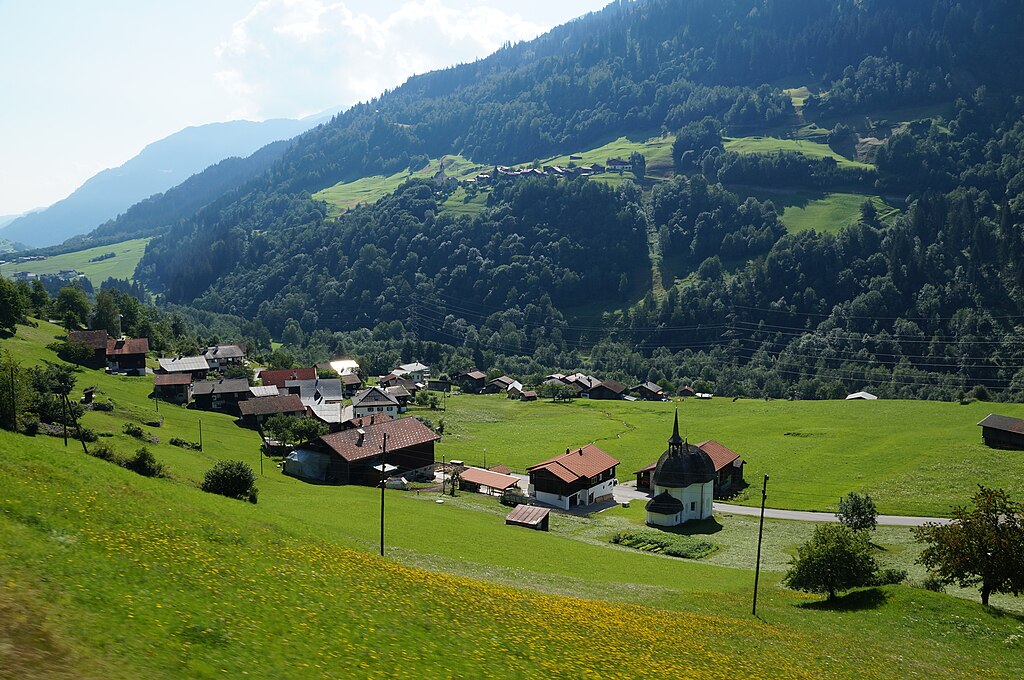
Join Susanna Bucher for a loop-hike along the Rhine River to the tiny historical artisan village of Disla (still ca. 90 inhabitants). See old wooden homes with charming gardens and other buildings with traditional picturesque facades. Further attractions: a flour mill, weaving mill, and cheese dairy; and the octagonal St. Luzius Chapel, held to be among the most beautiful Baroque buildings in Switzerland. This hike is rated as medium-level, ascending and descending 150 meters (500 feet).
Wear hiking boots or sturdy walking shoes. No sandals or street shoes!
• Hike duration: ca. 2.5 hours
• Disla elevation: 1,051 meters (3,448 feet)
• Sign-up at the Odyssey
• No Cost
For questions about this hike, contact [email protected]
18:30–24:00
Gala Closing
18:30–19:00 • Wine Reception
19:00–24:00 • Dinner
Saturday, June 1
7:00–8:00
Hotel Check-Out & Breakfast
8:00
Bus Check-in
8:30
Bus Departs for Zürich
11:15
Approximate Drop-Off at Zürich Airport, Departures
11:45
Approximate Arrival at the Zürich Bus Station
Travel Information
Your Stay in Zürich
For your connecting overnights in Zurich you can find hotels and helpful travel info using the button below. We recommend Fred Hotel Zürich (formerly Walhalla) and Hotel Montana, both of which are in walking distance of the main train station and bus station, and both of which offer breakfast and free WIFI.
Group Travel Information
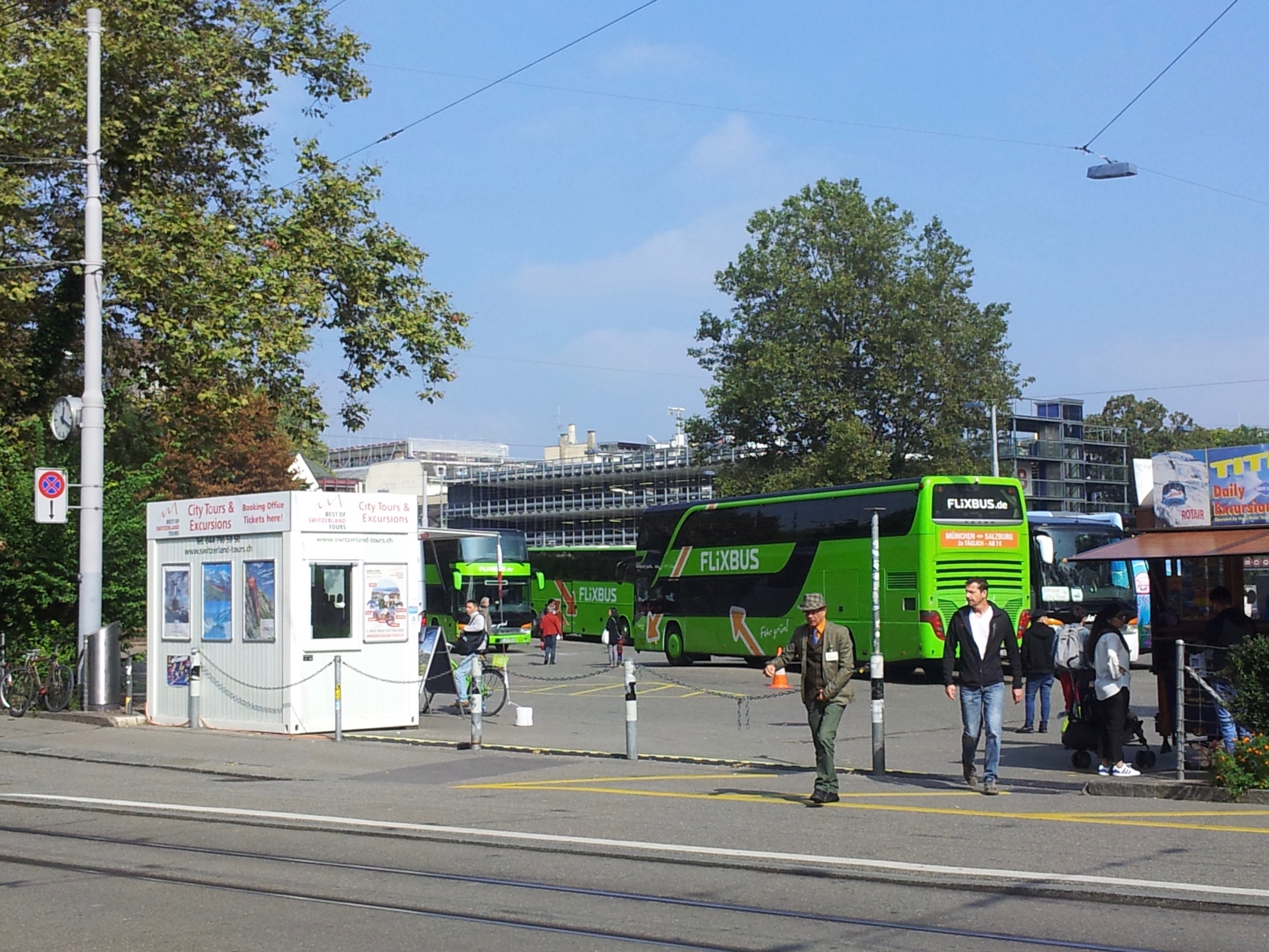
Saturday, May 25 • Bus • Zürich to Disentis
The Zürich Bus Station (CarPark Ausstellungsstrasse)
• Car/Taxi Entry: Ausstellungsstrasse 15, 8005 Zürich
• Pedestrian Entry: Opposite Starbucks and Fred Hotel on Limmatstrasse 5, 8005 Zürich
• Gather at 9:00 for 9:30 departure. Look for a white bus marked “Kopf.”
The photo shows the pedestrian entry opposite Starbucks and Fred Hotel. It is but a short walk from the Zürich Main Station and Hotel Montana. The same entry can also be reached on tram #4, #6, or #13. Get out at Sihlquai/HB; walk ca. 3 minutes.
Prelude • May 21–24
Consider coming early to Zürich, to attend the ISAP Prelude on your way to the Odyssey! This is a chance to experience our on-campus life and historically protected home, the erstwhile post office built in 1911, with an Art Nouveau design. At this occasion you are welcome to:
• Attend the 3-day academic program with a package discount for lectures & seminars
• Join our spring semester excursion to the Museum C.G. Jung Haus on the lakeside in Küsnacht; at cost for the entry fee and round-trip transportation
• Celebrate with us! Semester closing with music, wine, and generous appetizers (Apéro riche)—no cost
• Attend analysis or supervision
- Costs and payment methods vary according to the analyst.
- To arrange appointments, consult our List of Analysts. Or write to: [email protected]
- Kindly make appointments with the Counseling Service and individual analysts well ahead of your arrival.
Attendance of the Prelude requires separate registration and payment directly with ISAP.
For program details & registration, please use the button below or write to: [email protected]
Jungian Odyssey Committee
[email protected] • Fax +41 (0)43 268 5619
Academic Co-chairs
Maria Grazia Calzà, Dr. phil.
Lisa Holland, MS
Co-Chairs
Susanna Bucher, Dr. sc. nat. ETH
Isolde Kunerth, Dipl.-Päd.
Stacy Wirth, MA
Past Jungian Odysseys Photo Albums
Downloads
| File Name | Type | Permissions | Changed Date | Date | Size | ||||
|---|---|---|---|---|---|---|---|---|---|
pdf |
Jungian Odyssey 2024 Brochure | 0644 | 2023122106020121-Dec-2023 06:02 | 2023122006160220-Dec-2023 06:16 | 4 MB | Preview | Download | ||
pdf |
Jungian Odyssey 2024 Flyer | 0644 | 2023122106020321-Dec-2023 06:02 | 2023111311160013-Nov-2023 11:16 | 9 MB | Preview | Download | ||
pdf |
Jungian Odyssey 2024 General Terms and Conditions | 0644 | 2023120810570408-Dec-2023 10:57 | 2023110103200001-Nov-2023 03:20 | 171 KB | Preview | Download | ||
pdf |
Jungian Odyssey Prelude 2024 Flyer | 0644 | 2023122106020021-Dec-2023 06:02 | 2023111012390010-Nov-2023 12:39 | 47 KB | Preview | Download |
Combined size: 13 MB

